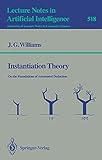Instantiation Theory [electronic resource] : On the Foundations of Automated Deduction / by James G. Williams.
Material type: TextSeries: Lecture Notes in Computer Science, Lectures Notes in Artificial Intelligence ; 518Publisher: Berlin, Heidelberg : Springer Berlin Heidelberg, 1991Description: VIII, 136 p. online resourceContent type: text Media type: computer Carrier type: online resourceISBN: 9783540475613Subject(s): Computer science | Computer software | Algebra -- Data processing | Artificial intelligence | Logic, Symbolic and mathematical | Computer Science | Artificial Intelligence (incl. Robotics) | Mathematical Logic and Formal Languages | Symbolic and Algebraic Manipulation | Algorithm Analysis and Problem Complexity | Programming Techniques | Mathematical Logic and FoundationsAdditional physical formats: Printed edition:: No titleDDC classification: 006.3 LOC classification: Q334-342TJ210.2-211.495Online resources: Click here to access online
TextSeries: Lecture Notes in Computer Science, Lectures Notes in Artificial Intelligence ; 518Publisher: Berlin, Heidelberg : Springer Berlin Heidelberg, 1991Description: VIII, 136 p. online resourceContent type: text Media type: computer Carrier type: online resourceISBN: 9783540475613Subject(s): Computer science | Computer software | Algebra -- Data processing | Artificial intelligence | Logic, Symbolic and mathematical | Computer Science | Artificial Intelligence (incl. Robotics) | Mathematical Logic and Formal Languages | Symbolic and Algebraic Manipulation | Algorithm Analysis and Problem Complexity | Programming Techniques | Mathematical Logic and FoundationsAdditional physical formats: Printed edition:: No titleDDC classification: 006.3 LOC classification: Q334-342TJ210.2-211.495Online resources: Click here to access online  E-BOOKS
E-BOOKS
| Current library | Home library | Call number | Materials specified | URL | Status | Date due | Barcode |
|---|---|---|---|---|---|---|---|
| IMSc Library | IMSc Library | Link to resource | Available | EBK6109 |
Background -- General approaches to instantiation -- Classification properties -- Homomorphisms -- Construct bases -- Unification - an algorithm and its soundness -- Term-implementation and completeness -- Implementation and computational complexity -- Related issues not addressed.
Instantiation Theory presents a new, general unification algorithm that is of immediate use in building theorem provers and logic programming systems. Instantiation theory is the study of instantiation in an abstract context that is applicable to most commonly studied logical formalisms. The volume begins with a survey of general approaches to the study of instantiation, as found in tree systems, order-sorted algebras, algebraic theories, composita, and instantiation systems. A classification of instantiation systems is given, based on properties of substitutions, degree of type strictness, and well-foundedness of terms. Equational theories and the use of typed variables are studied in terms of quotient homomorphisms and embeddings, respectively. Every instantiation system is a quotient system of a subsystem of first-order term instantiation. The general unification algorithm is developed as an application of the basic theory. Its soundness is rigorously proved, and its completeness and efficiency are verfied for certain classes of instantiation systems. Appropriate applications of the algorithm include unification of first-order terms, order-sorted terms, and first-order formulas modulo alpha-conversion, as well as equational unification using simple congruences.


There are no comments on this title.